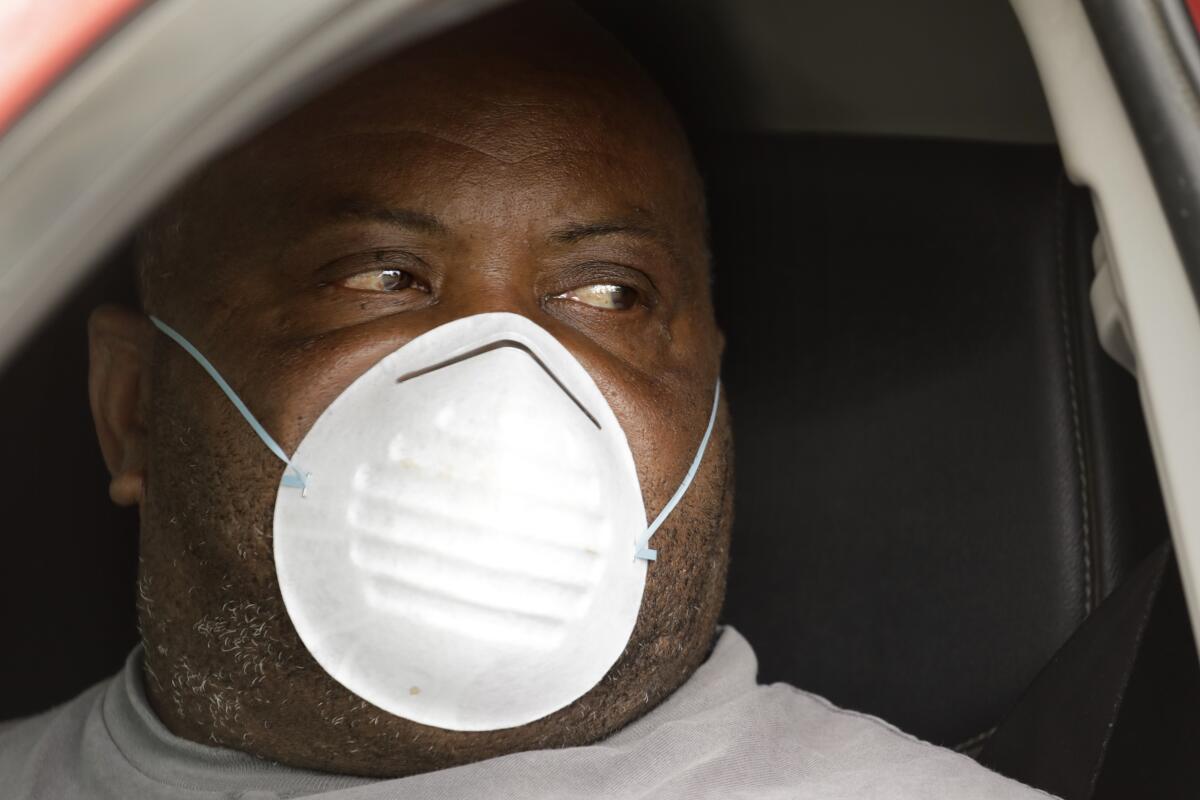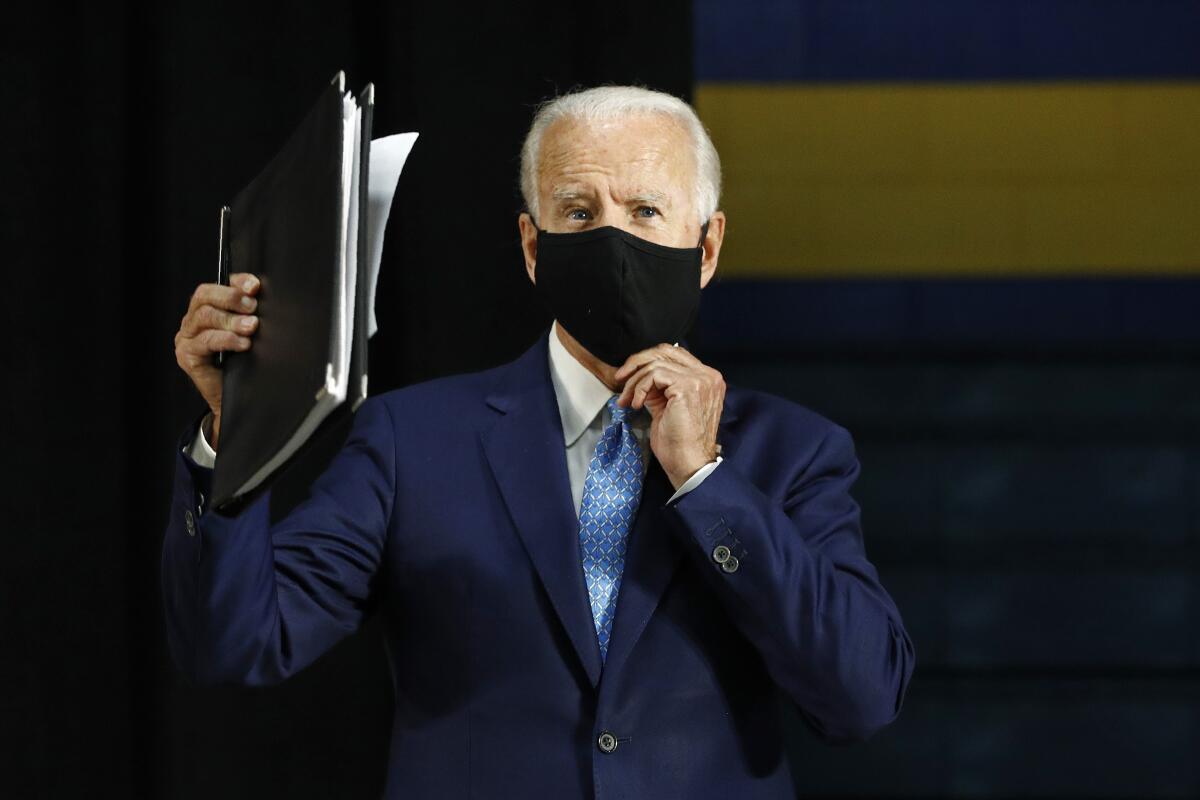Trump and Biden offer starkly different visions of U.S. healthcare

- Share via
WASHINGTON — Few issues have more sharply divided Republicans and Democrats over the last decade than healthcare, and so it is with President Trump and former Vice President Joe Biden.
The two men offer starkly different visions of what the federal government should do to ensure that Americans have access to affordable medical care.
They diverge on the 2010 Affordable Care Act, often called Obamacare, and on what protections health insurers should to be required to offer consumers. They have contrasting visions of Medicare and Medicaid, the government health plans for the elderly and the poor.
Trump and Biden have outlined different strategies for reining in prescription drug prices. They take opposite approaches to reproductive health policy and abortion rights.
And they have embraced distinct visions of public health and how to confront the coronavirus crisis, which has killed more than 200,000 people in the U.S. Trump was hospitalized for three nights with COVID-19 early this month.
Here’s a look at what the two candidates are proposing on healthcare:

Joe Biden
During the Democratic primaries, Biden diverged from many of his rivals by rejecting calls to move all Americans into a single government health plan: “Medicare for all.”
Biden, who as vice president was a strong supporter of President Obama’s push to enact the Affordable Care Act, argued that expanding the 2010 law and keeping a mix of government plans and employer-based insurance would be more practical, less costly and less disruptive.
But he has called for a public option, a Medicare-like plan that would be available to Americans who cannot afford commercial insurance or live in a state that hasn’t expanded Medicaid eligibility.
Biden favors increasing subsidies to help Americans buy plans on insurance marketplaces created by the Affordable Care Act.
He has indicated he would roll back Trump administration policies that loosened rules on health insurers and allowed some to offer limited insurance policies that cap benefits and exclude coverage for some diseases and preexisting conditions.
Biden has proposed a long list of proposals to control drug prices, including empowering Medicare to negotiate with drug companies. That’s a longtime priority for Democrats that many experts believe would save money for the federal government.
He also would create a board that could assess the value of new drugs and recommend a price, a model that has effectively restrained prices in other wealthy countries such as Germany.
Where President Trump and Joe Biden stand on immigration policy, including DACA, refugees, asylum seekers, pathways to citizenship and deportations.
Like most Democrats, Biden has been a strong supporter of abortion rights, and he would probably reverse many of the restrictions imposed by the Trump administration.
On the coronavirus, Biden repeatedly has said he would give priority to advice from public health experts and would let them drive the national response to the pandemic.
Unlike Trump, Biden has been a vocal advocate for broader use of face masks to reduce the spread of infection, a position broadly backed by epidemiologists, public health officials and other experts.
In his speech in Wilmington, Del., in which he introduced Sen. Kamala Harris as his running mate, he pledged that his administration would offer “a comprehensive plan to meet the challenge of COVID-19 and turn the corner on this pandemic.”
Among the elements he cited were “masking; clear, science-based guidance; dramatically scaling up testing” and “giving states and local governments the resources they need to open schools and businesses safely.”
He has also said that “scientists and public health experts should decide on safety and efficacy” of any vaccine. “The White House should not weigh in on these matters or push the FDA to provide emergency authorizations prematurely,” he said in a statement in late July.
The Biden campaign has posted his healthcare plan on its website.

President Trump
Trump has offered little detail about what his healthcare agenda would look like in a second term.
Despite years of promising a replacement for the Affordable Care Act, Trump hasn’t offered any plan. His campaign website — unlike most campaigns over the last two decades — has no list of healthcare priorities.
A spokesman for the campaign declined to offer any detail about Trump’s healthcare platform, saying only that the president would “continue to prioritize the health and well-being of the American people while undoing the damage caused by the previous administration.”
Nevertheless, Trump has offered clues about his healthcare priorities over his first term.
He remains a fervent supporter of rolling back the Affordable Care Act, an effort he supported in his first year in office when Republicans pushed it in Congress. His administration is currently asking the Supreme Court to overturn the entire law, and he has repeatedly called for repeal of its provisions in his annual budgets.
The Trump administration issued regulations that allow health insurers to avoid consumer protection mandates in the healthcare law that require health plans to cover a basic set of benefits. That move has led to the proliferation of short-term plans that are sometimes cheaper for people who qualify — mostly those who are young and healthy — but which offer skimpier coverage.
The president has also consistently backed major cuts to federal healthcare programs, including Medicaid. His administration has proposed hundreds of billions of dollars in reductions in Medicaid and tighter restrictions on who can get coverage, saying that the benefits currently offered cost taxpayers too much and discourage people from seeking work.
Through his first term, Trump has repeatedly promised to lower drug prices, a pledge he also made during his 2016 campaign.
Trump and Biden hold radically different views on environmental policy and climate change. Here’s what voters can expect from the next president.
With many of his initiatives on drug prices still unfulfilled, the president recently directed his administration to make it easier to import cheaper drugs from other countries and to limit the rebates that middlemen, known as pharmacy benefit managers, can receive when they negotiate prices with drugmakers on behalf of health insurers. Those new efforts would not take effect until well after the election, if then.
In his 2016 campaign, Trump supported allowing Medicare to negotiate drug prices. Once in office, however, he dropped the idea, which has been fiercely opposed by drugmakers and Republican lawmakers.
The Trump administration has strongly backed initiatives to restrict access to abortion, to block funding for Planned Parenthood and overseas aid groups that counsel women about abortion and to lift the rules that require health plans to cover contraceptives for women. Those efforts probably would continue in a second Trump term.
On the coronavirus, it is unclear what, if anything, the president would do differently if reelected. He has continued to call for schools, sports leagues and businesses to reopen and has repeatedly said that he expects the virus eventually to “disappear.”
His administration has put billions of dollars into efforts to fast-track development of a vaccine, which Trump has sometimes said could be approved for use before the November election.
Despite the huge death toll from the illness in the U.S., the Trump campaign points to the president’s work on the pandemic as one of the major accomplishments of his first term, characterizing it as “a bold, aggressive, and decisive response.”
Although the Trump campaign site doesn’t feature a healthcare plan, it lists what the campaign views as his healthcare accomplishments.
More to Read
Get the L.A. Times Politics newsletter
Deeply reported insights into legislation, politics and policy from Sacramento, Washington and beyond. In your inbox three times per week.
You may occasionally receive promotional content from the Los Angeles Times.













